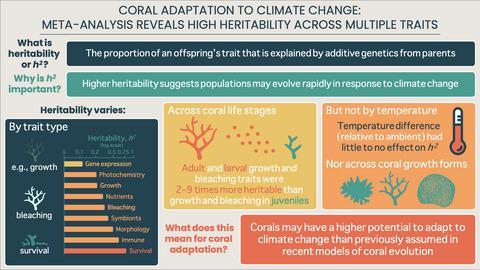当前位置:
X-MOL 学术
›
Glob. Change Biol.
›
论文详情
Our official English website, www.x-mol.net, welcomes your
feedback! (Note: you will need to create a separate account there.)
Coral adaptation to climate change: Meta-analysis reveals high heritability across multiple traits
Global Change Biology ( IF 10.8 ) Pub Date : 2021-09-05 , DOI: 10.1111/gcb.15829 Kevin R Bairos-Novak 1 , Mia O Hoogenboom 1 , Madeleine J H van Oppen 2, 3 , Sean R Connolly 1, 4
Global Change Biology ( IF 10.8 ) Pub Date : 2021-09-05 , DOI: 10.1111/gcb.15829 Kevin R Bairos-Novak 1 , Mia O Hoogenboom 1 , Madeleine J H van Oppen 2, 3 , Sean R Connolly 1, 4
Affiliation

|
Anthropogenic climate change is a rapidly intensifying selection pressure on biodiversity across the globe and, particularly, on the world's coral reefs. The rate of adaptation to climate change is proportional to the amount of phenotypic variation that can be inherited by subsequent generations (i.e., narrow-sense heritability, h2). Thus, traits that have higher heritability (e.g., h2 > 0.5) are likely to adapt to future conditions faster than traits with lower heritability (e.g., h2 < 0.1). Here, we synthesize 95 heritability estimates across 19 species of reef-building corals. Our meta-analysis reveals low heritability (h2 < 0.25) of gene expression metrics, intermediate heritability (h2 = 0.25–0.50) of photochemistry, growth, and bleaching, and high heritability (h2 > 0.50) for metrics related to survival and immune responses. Some of these values are higher than typically observed in other taxa, such as survival and growth, while others were more comparable, such as gene expression and photochemistry. There was no detectable effect of temperature on heritability, but narrow-sense heritability estimates were generally lower than broad-sense estimates, indicative of significant non-additive genetic variation across traits. Trait heritability also varied depending on coral life stage, with bleaching and growth in juveniles generally having lower heritability compared to bleaching and growth in larvae and adults. These differences may be the result of previous stabilizing selection on juveniles or may be due to constrained evolution resulting from genetic trade-offs or genetic correlations between growth and thermotolerance. While we find no evidence that heritability decreases under temperature stress, explicit tests of the heritability of thermal tolerance itself—such as coral thermal reaction norm shape—are lacking. Nevertheless, our findings overall reveal high trait heritability for the majority of coral traits, suggesting corals may have a greater potential to adapt to climate change than has been assumed in recent evolutionary models.
中文翻译:

珊瑚对气候变化的适应:荟萃分析揭示了多个性状的高遗传性
人为气候变化是对全球生物多样性,特别是对世界珊瑚礁的迅速加剧的选择压力。对气候变化的适应率与可被后代遗传的表型变异量成正比(即狭义遗传力,h 2)。因此,具有较高遗传力的性状(例如,h 2 > 0.5)可能比具有较低遗传力的性状(例如,h 2 < 0.1)更快地适应未来的条件。在这里,我们综合了 19 种造礁珊瑚的 95 种遗传力估计值。我们的荟萃分析显示低遗传力 ( h 2< 0.25) 的基因表达指标, 光化学、生长和漂白的中等遗传力 ( h 2 = 0.25–0.50),以及高遗传力 ( h 2 > 0.50) 用于与存活和免疫反应相关的指标。其中一些值高于在其他分类群中通常观察到的值,例如存活和生长,而其他值则更具可比性,例如基因表达和光化学。温度对遗传力没有可检测的影响,但狭义遗传力估计值通常低于广义估计值,表明性状之间存在显着的非加性遗传变异。性状遗传力也因珊瑚的生命阶段而异,与幼虫和成虫的白化和生长相比,幼体的白化和生长通常具有较低的遗传力。这些差异可能是先前对幼鱼进行稳定选择的结果,也可能是由于生长和耐热性之间的遗传权衡或遗传相关性导致的进化受限。虽然我们没有发现遗传力在温度压力下会降低的证据,但缺乏对热耐受性本身的遗传力的明确测试——例如珊瑚热反应规范形状——。尽管如此,我们的研究结果总体上揭示了大多数珊瑚性状的高性状遗传性,这表明珊瑚可能比最近的进化模型中假设的具有更大的适应气候变化的潜力。
更新日期:2021-10-15
中文翻译:

珊瑚对气候变化的适应:荟萃分析揭示了多个性状的高遗传性
人为气候变化是对全球生物多样性,特别是对世界珊瑚礁的迅速加剧的选择压力。对气候变化的适应率与可被后代遗传的表型变异量成正比(即狭义遗传力,h 2)。因此,具有较高遗传力的性状(例如,h 2 > 0.5)可能比具有较低遗传力的性状(例如,h 2 < 0.1)更快地适应未来的条件。在这里,我们综合了 19 种造礁珊瑚的 95 种遗传力估计值。我们的荟萃分析显示低遗传力 ( h 2< 0.25) 的基因表达指标, 光化学、生长和漂白的中等遗传力 ( h 2 = 0.25–0.50),以及高遗传力 ( h 2 > 0.50) 用于与存活和免疫反应相关的指标。其中一些值高于在其他分类群中通常观察到的值,例如存活和生长,而其他值则更具可比性,例如基因表达和光化学。温度对遗传力没有可检测的影响,但狭义遗传力估计值通常低于广义估计值,表明性状之间存在显着的非加性遗传变异。性状遗传力也因珊瑚的生命阶段而异,与幼虫和成虫的白化和生长相比,幼体的白化和生长通常具有较低的遗传力。这些差异可能是先前对幼鱼进行稳定选择的结果,也可能是由于生长和耐热性之间的遗传权衡或遗传相关性导致的进化受限。虽然我们没有发现遗传力在温度压力下会降低的证据,但缺乏对热耐受性本身的遗传力的明确测试——例如珊瑚热反应规范形状——。尽管如此,我们的研究结果总体上揭示了大多数珊瑚性状的高性状遗传性,这表明珊瑚可能比最近的进化模型中假设的具有更大的适应气候变化的潜力。











































 京公网安备 11010802027423号
京公网安备 11010802027423号